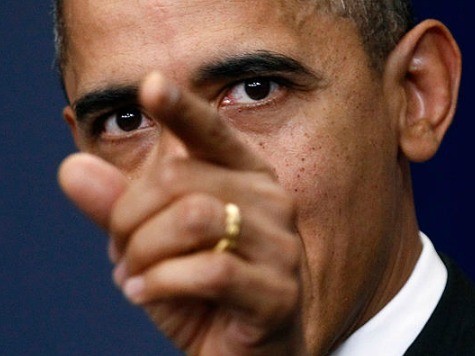
Why are the US authorities trying to extradite and imprison arguably the one man in the world with the skills and influence to bring peace, stability, and prosperity to fractured Ukraine?
This week I flew to Vienna, Austria, to find out in a world exclusive interview with Ukraine’s Dmitry Firtash, the billionaire industrialist, philanthropist, and political fixer who is striving desperately to help his country forge an independent future free from the bullying of Russia and the meddling of the West in next month’s scheduled elections.
And his biggest obstacle? According to Firtash, it’s Barack Obama.
Earlier this month, at the request of the FBI, with a warrant signed by a Chicago judge, Firtash was detained by the Austrian authorities while on a business trip to Vienna. He is now stuck in Austria awaiting extradition to the U.S. under the Foreign Corrupt Practices Act relating to a 2006 business deal in India where he is alleged to have bribed officials. His bail has been set at a record €125 million and he has been warned that potentially, the US could confiscate his personal fortune, worth in excess of $7 billion.
Whatever the rights and wrongs of the case (frankly, is it even possible to conduct business deals in places like India without greasing the odd palm?), what looks suspicious about it is the timing. Could it be that the Obama administration–in its desperate, hamfisted attempts to strike back at Vladimir Putin–is the real mover behind the arrest of about the only man capable of thwarting Russia’s neo-imperialist ambitions in the Ukraine?
Firtash certainly thinks so. “Russia is a beautiful, nice, and very democratic country, and so, we have learned from Edward Snowden, is America,” he told me, sarcastically through an interpreter. “And caught in the middle is Ukraine, a country which because of its geographical position looks East and West but wishes to belong to neither. I don’t know who it is that the Americans have decided I am, but what is clear is that my country is being used as a playground by the superpowers.”
Oligarchs–a term Firtash hates, by the way, because he thinks it’s too associated with the collapsing Soviet Union–almost never gives interviews. The only reason he agreed to speak to me (against the advice of his expensive U.S. lawyers) was to try to set the record straight. His arrest, he believes, is politically motivated–an attempt by Obama to get at Putin. The U.S. authorities deny this, but there are certainly puzzling factors: why, for example, was Firtash the only one of six men named on the indictment to be arrested–even though another of the men was with Firtash at the time of his arrest and was ignored by police?
If this really is an attempt by the Obama administration to get at Putin, Firtash could scarcely be a less appropriate target. Yes, it’s true that Firtash made much of his vast fortune as the middle man in various central European energy deals, which included negotiations with the Russian-state-owned gas giant Gazprom. To do otherwise in this region would have been impossible. But that certainly doesn’t mean that this makes Firtash Putin’s bagman.
On the contrary, Firtash’s negotiating skills are the reason that, for a brief period in the 2000s, Ukraine actually enjoyed a degree of energy independence from Russian bullying. One of Ukraine’s main problems is that it is highly dependent on Russian natural gas, making it extremely vulnerable to blackmail from Putin, who can ratchet up Ukraine’s energy prices and wipe out its industry any time he likes–just as he is doing now.
But in 2006, Firtash helped find a way round this difficulty. He negotiated a long-term contract whereby Ukraine would import part of its gas, cut-price, from Turkmenistan and the rest from Russia, with Gazprom getting a cut of the deal. The Russians were happy. The Ukrainians were happy. Everyone was happy apart from Firtash’s arch-rival, the witch-like, notoriously corrupt former Ukrainian president Julia Timoshenko–who first tried to get a cut of the deal and then, when that failed, scrapped it and negotiated a new one more favourable to her and the Putin regime. The people who suffered were the Ukrainians–whose gas prices more than doubled. Ukraine currently owes Gazprom $2.5 billion–giving Russia yet another excuse to tighten its noose round its impoverished southern neighbour’s neck.
Like all Ukrainian oligarchs (there are only about eight of them), Firtash has to tread dexterously in the political scene, maintaining alliances on both sides of the divide–the Maidan nationalists on the one hand, the pro-Russian faction on the other. Though he worked with the recently ousted president Victor Yanukovich, he was no great fan–and was instrumental in warning the Russians that the corruption of Yanukovich and his family had grown intolerable and that he would have to go. He is no more greatly enthused by the current interim government, whose incompetence–and failure to represent the interests of Russophile eastern Ukraine–is now being exploited by Putin.
What Firtash wants more than anything is for the planned elections to go ahead on May 25 so that Ukraine once more has democratic legitimacy. He wants to use his own resources to help Ukraine develop its massive shale gas reserves, which would bring to an end Russia’s attempts at energy blackmail and enable Ukraine to enjoy some kind of economic revival.
With Russian tanks on the border and Russian special forces agents creating mayhem in the eastern cities, this peace and stability is looking increasingly unlikely. But from Firtash’s perspective, the bigger threat right now is not the aggression of Vladimir Putin, but what he sees as the bullying judicial imperialism of the Obama administration.

COMMENTS
Please let us know if you're having issues with commenting.